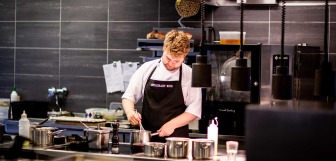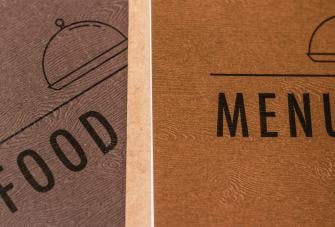Restaurant Kitchen Equipment and Essentials
The kitchen is the beating heart of any restaurant and the driving force behind a venue’s success. In fact, you could employ the most renowned chef, yet if your kitchen equipment is sub-par, then there’s only so far they’ll be able to take your cuisine.
Since the success or failure of a restaurant can be determined by a commercial kitchen's design and equipment quality, it is essential to plan and budget accordingly. With the average cost of kitchen remodels often exceeding six digits, it’s crucial to balance the items that are essential with those that are merely nice-to-haves.
Whether you’re looking to start a completely new business, or are simply renovating an existing commercial kitchen, managing a kitchen install is no small feat. In the initial planning stage, you will have to consider the location of the primary kitchen equipment, prep and storage zones, sinks, and dishwashers. As the planning progresses, decisions will need to be made on appliance brand and sizes, design, style, and layout.
With so many crucial decisions to make, it’s easy to overlook some of the all-important essentials that are needed in a commercial kitchen. So to prepare you for your planning journey we’ve put together a list of kitchen appliances, equipment, and other essentials needed in a top-quality kitchen.
Cooking Equipment
The cooking equipment you have in your kitchen determines both the efficiency and flow of your entire operation. While your head chef is usually the heart of your kitchen, the quality and type of cooking equipment make a huge impact on performance. Choosing the type of equipment you need will greatly depend on your business structure and serving style.
Items to consider
- Ovens: First and foremost is the oven. Selecting the right oven depends largely on the restaurant type and the food you will be serving. For example, bakeries will probably need a different oven to a fine dining restaurant which may be better suited to a range. When selecting an oven keep these things in mind
- Size
- Quality
- Function
- Type - Commercial, Convection, Combination, Pizza, Conveyor.
- Ranges: If you opt for a range in your kitchen you will have the choice of Electric or Gas.
- Burners
- Freestanding
- Benchtop
- Grills
- Griddles
- Deep Fryers
- Microwaves
Ventilation
Adequate ventilation is extremely important. Commercial kitchens can be an uncomfortable and crowded space to work in. Ventilation systems help to manage the airflow and temperature of the kitchen to help maintain a pleasant and healthy environment for your staff.
When choosing the right ventilation keep these factors in mind:
- Exhaust rate: This is the rate air moves through your ducts and will be required more so if your kitchen uses an open flame when cooking/grilling
- Size: Take into consideration the size of your kitchen and the amount of space you have for a ventilation system
- Noise: Fans can be extremely noisy in an already loud environment like a commercial kitchen, so definitely take into consideration this added noise from ventilation.
Refrigeration
All commercial kitchens require a refrigeration system of some type. Without a fridge, the kitchen can not keep ingredients and prepped food fresh. Freezers are also a crucial part of inventory management.
Firstly, you will want to consider the size and capacity of your restaurant so you can determine the type of refrigeration your business needs. Reach-in refrigerators are normally more convenient for staff, but walk-in coolers are also a great option if space permits and food storage requirements are high.
Taking the time to plan and consider the best possible refrigerator and freezer options for your restaurant will help ensure quality in the ingredients your kitchen prepares.
Items to consider
- Freezers:
- Chest Freezers
- Upright Freezers
- Under-counter Freezers
- Counter Freezers
- Fridges:
- Upright Fridges
- Counter Fridges
- Under-counter Fridges
- Low Fridges
- Ice Makers, Crushers, & Storage: Ice markers are a dependable solution for hotels, bars and clubs who need a reliable source of ice year-long.
- Under Bench and modular ice machines
- Ice Crushers
- Ice Bins
Benchtop Equipment
A versatile appliance in a commercial kitchen is essential. With there being multiple benchtop appliances available the choices become endless. To work out exactly what your kitchen will need you will need to work out what your menu items will look like and the prep work they require.
Items to consider
- Food Processors: Food processors are a fantastic multi-purpose kitchen appliance that can be used for chopping, slicing, grinding, and pureeing a range of foods. While there are many different types of food processors on the market, there are four main varieties to choose from.
- Batch Bowl processor
- Continuous feed food processor
- Buffalo Choppers
- Combination Processors
- Mixers & Blenders: If you are planning on making your own bread or desserts in house, you may need to invest in a commercial mixer. The type will depend on how much you expect to produce. Blenders are also another important item your kitchen may require. Used to blend smoothies, milkshakes, frozen juices, cocktails, and purees.
- Stick Blenders
- Hand Mixers
- Floor Mixers
- Countertop mixers
- Milkshake & Smoothie Blenders
- Kitchen Blenders
- Bar Blenders
- Slicers: Slicers are a great tool for slicing different types of foods like meats and cheeses. While these may not be necessary for every kitchen, they can certainly speed up food preparation in a simple, safe, and hygienic way.
- Automatic or Manual
- Meat Slicers
- Tomato slicers
- Vegetable prep machines
- Salamanders: A versatile piece of kitchen equipment used to broil, brown, glaze, caramelise, grill and toast.
- Toasters
- Vertical toasters
- Conveyor toasters
- Griddle toasters
- Beverage brewers
Sinks & Dishwashers
Sinks are vital to any kitchen as they provide space for hand washing, food prep, and dishwashing. Health and safety protocols in different regions will define the minimum sink requirements for commercial kitchens as well as the need for dedicated handwashing stations and commercial dishwashers.
Sinks to consider
- Compartment sinks
- Bar Sinks
- Disposal sinks
- Drop-in units
- Handwashing sink
- Mop/cleaning sinks
Commercial Dishwasher types
- Under Bench Dishwasher
- Pass-through & Rack Conveyor Dishwasher
- Pot & utensil Washers
- Glass Washers
Kitchen Benches and Storage
Moving past the equipment and appliances needed, are the next important factors, bench space, and food storage.
Things to consider
- Food prep benches: Inadequate food preparation space slows the preparation process. Adding considerable thought into the design and layout of your kitchen will aid in maximising prep areas. Stainless steel is the obvious choice for kitchen benches as they are sturdy and don’t absorb any bacteria.
- Counters
- Cutting Surfaces
- Cutting Boards
- Storage: Every kitchen needs good shelving and food storage. Your storage choices need to be durable and suited to your kitchen requirements. Mobile storage racks may be more convenient for your kitchens’ operations. Planning out your shelving and storage units is an important part of your commercial kitchen layout plan.
- Drying racks: Drying racks have a dual-purpose use by providing a convenient place to both dry and temporarily store crockery, glassware, cookware, and utensils during busy periods.
- Storage Containers: Every successful restaurant needs to be minimising food wastage which means proper food storage and practices. Because of the different types of food used during the cooking process, it’s necessary to have an assortment of storage containers.
- Vegetable crispers
- Ingredient Bins
- Kitchen Canisters
- Food Storage containers
Cookware, Kitchenware & Crockery
Every good chef knows that you need the right dishes and utensils for your kitchen. Not only for serving and presentation of your food, but also for preparation. A well-prepared kitchen is going to need stock cutlery, bowls, ramekins, cups, glassware, platters and plates, as well as extras to account for breakage.
The volume needed will depend on your restaurant size, and the types of dishes and drinks you prepare. Consider things like table turnover rate, the number of seats at your restaurant, your most popular dishes, and how many people you expect during your busiest days and times.
Things to consider:
- Knives: The chef’s knife is the cornerstone of the food preparation process.
- Cleaver
- Paring Knife
- Chef or Santoku Knife
- Boning Knife
- Fillet knife
- Carving knife
- Bread knife
- Sharpening Stone: To keep your knives in tip-top shape, you need to invest in sharpening stones
- Dinnerware
- Plates
- Platters
- Bowls
- Serving dishware
- Glassware
- Wine glasses
- Champagne glasses
- Cocktail glasses in a wide variety
- Beer glasses
- Water glasses
- Specialty glassware
- Cutlery
- Knives
- Forks
- Spoons
- Serving Utensils
- Turners & Tongs
- Whisks
- Spatulas
- Ladles
- Baking pans
- Towels and Rags
- Cutting Boards: One area of particular concern for commercial kitchens is cross-contamination, which can occur through cutting boards. So choosing the right surface for your food preparation is of paramount importance to protect the health and safety of your customers.
- Pots & Pans: It is essential to have a large range of pots and pans of all sizes with lids.
- Mixing bowls: Mixing bowls have a variety of uses around the kitchen and come in a range of sizes depending on the amount and type of ingredients mixed.
- Crockery
Kitchen Display Screens (KDS)
Kitchens are a busy, crowded, noisy environment. Yelling orders over the pass, and working with handwritten dockets, leaves room for errors. This is why we suggest that venues with busy kitchens invest in a Kitchen Display Screen (KDS).
Implementing a KDS will allow your kitchen staff to gain instant access to orders - and orders are instantly sent and can be updated if your customers change their mind, meaning your chefs can react quickly and avoid wasteful preparation.
With the Epos Now KDS orders can be colour-coded, so your team knows whether orders are dine-in or takeaway or if a table has been waiting a substantial amount of time for their order. At a snapshot see how many orders you have on the go at any one point and you can easily recall an order if it was accidentally cleared off. Additionally, line item completion allows your kitchen to complete large orders in stages so your team takes out food while it's still piping hot.
Regulatory Compliance
The cleaning and sanitising of a commercial kitchen is extremely important to prevent harmful bacteria and possible cross-contamination. Creating a cleaning schedule and systemising the cleaning process will help ensure you don’t attract attention from health and safety regulators. The cleaning and safety protocols needed for your kitchen will vary greatly depending on these regulations, so it is best to consult an expert and form a process that meets these requirements.
- Basic Cleaning supplies
- Buckets
- Floor Mats
- Hand soap and sanitisers
- Microfibre cloths and cleaning rags
- Wet floor signs
- Brooms and dustpans
- Restroom supplies
- Safety: Safety in the workplace is a high priority. As a business owner it is your responsibility to provide your staff with a safe environment to work in. Again it is best practice to consult with a safety officer in your are to work out the safety requirements needed but some safety equipment inclusions are
- Fire blanket
- Fire extinguishers
- First aid kit
- Heat detection devices
- Fire suppression systems
The cooking needs of commercial kitchens vary enormously depending on their size, cooking style, and menu. This guide was developed with the aim of providing a list of the most commonly used pieces of equipment in a commercial kitchen.
Doing your research is paramount when it comes to starting to source commercial kitchen equipment.
Run your Restaurant Kitchen efficiently with Epos Now
Your point of sale system is crucial to your restaurant business. With the Epos Now POS system, you can:
- Connect with 100+ apps to help with items like marketing, customer loyalty, and accounting
- Accept credit, debit, gift cards, and contactless payments
- Manage your store from anywhere with 24/7 cloud access




